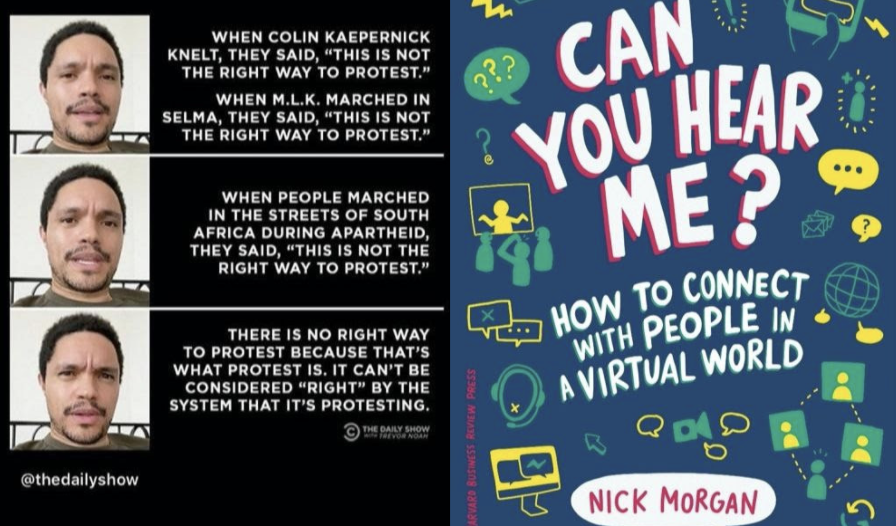Since George Floyd’s murder I’ve found myself immersed in conversations about systemic racism and my bubble of white privilege. Only days ago, having finished reading Can You Hear Me? by Nick Morgan, I had a blog swirling in my mind about virtual communication, its impact and my experience of it when mediating with divorcing couples. Virtual communication, in contrast and magnitude to the murder of an innocent black man, now seemed insignificant. However despite, and perhaps because of the big world problems we’re experiencing, communicating in all forms is essential. Therefore, I hope that discussing virtual communication through a broader societal lens might shine some light not only on restructuring families, but also on our overdue conversation about the embedded societal alienation of people of color in the United States.
During the past few months I’ve found myself feeling simultaneously more connected and less connected to other people. By which I mean I’ve talked with more people across a larger geographic expanse but somehow felt that the conversations were always only 80% good. In Nick Morgan’s book he talks about how difficult it is to create empathy and emotional clarity through virtual communication, where body language and both undertones and overtones, vocal sounds that convey emotion, are missing in the conversation. Before reading Nick’s book, I had never given any thought to the importance of Hertz levels in our communication but as he explains so beautifully, when engineers were figuring out ways to condense the signal that is the human voice they realized they could get the important part of human speech if they just took the 85-255 Hertz range thereby cutting out the overtones and undertones of human voices (which range from 20 – 20,000 Hertz) and which give each voice its unique timbre and distinctive quality, and create our instantaneous ability to hear a person’s voice and readily conjure up their image. It turns out the undertones convey emotions particularly well and when they’re removed, they make conversation less interesting.
When Covid-19 required many of us to begin working remotely, I began using videoconferencing to mediate with couples I had formerly been working with in my office. What became immediately apparent was that couples seemed less emotional. It’s of course not as impactful to scream or cry when you’re not in the same room as someone else, but also for many people the consequence of those tamped down emotions seemed to translate into a better ability to harness the logical parts of their brains. Mediation is useful to process emotions but it also involves solving concrete problems. Nick Morgan’s book describes a shortcoming of virtual communication that might actually be an asset in mediations. Although conveying emotions is a necessary component in resolving conflict and moving forward, solving problems is another part of the resolution equation. The result of my inadvertent mediation experiment has made me consider possible ways to structure post-Covid mediations so that perhaps some sessions could be spent in-person processing the emotional fallout of a marital dissolution and others could be spent in a video conference format distilling and resolving asset divisions, property valuation and related details.
So what does my new understanding of virtual communication have to do with George Floyd’s murder, inherent racism and white privilege? During the past week my daughters have been leading my husband and myself in readings about and discussions around white privilege, and its systemic oppression of people of color. The conversations have been emotional, enlightening, revealing and difficult. Those discussions have led to recent conversations with some of my peers and colleagues which have made me aware of reluctance accepting the concept of white privilege, stating as a defense “I am not racist”.
Distilling the differences between racism, bigotry and white privilege is challenging. While we all have implicit biases about race and many other human characteristics, thankfully we are not all bigots who unfairly judge people. White privilege is different from either of those concepts, unseen and unspoken, like fish unaware of the water they swim in, white people don’t notice the water around them. As allies, it’s incumbent upon us to share the water. We can look for ways to use our voices and speak out, support organizations like GirlTrek,* which has a foundational belief that “the trauma of systemic racism is killing black women.” GirlTrek’s response is to walk and heal together, to create a national movement that activates thousands of black women to be change makers in their lives and in their communities.
Having and using our voices, in one another’s presence and virtually, has never felt more critical to me. We must listen to emotions, and with equal commitment work to understand the logic behind its origins. Failing to truly hear one another has imperiled our society; if we can’t learn to restructure our micro-lives as families, and our macro-lives as a society, we will lose the unions that so many of us hold dear. As Martin Luther King Jr. so wisely said: “We must live together as brothers or perish together as fools.”
*Consilium Divorce Consultations has made a donation to GirlTrek in honor of our clients, colleagues and friends.
(781)259-1500
info@ConsiliumDivorce.com

